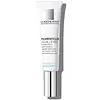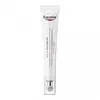What's inside
What's inside
 Key Ingredients
Key Ingredients

 Benefits
Benefits

 Concerns
Concerns

 Ingredients Side-by-side
Ingredients Side-by-side

Water
Skin ConditioningGlycerin
HumectantButylene Glycol
HumectantDimethicone
EmollientNiacinamide
SmoothingIsopropyl Palmitate
EmollientCetearyl Alcohol
EmollientAmmonium Polyacryloyldimethyl Taurate
Emulsion StabilisingButyrospermum Parkii Butter
Skin ConditioningPEG-100 Stearate
PEG/PPG/Polybutylene Glycol-8/5/3 Glycerin
HumectantStearic Acid
CleansingGlyceryl Stearate
EmollientDimethicone/Vinyl Dimethicone Crosspolymer
Skin ConditioningDimethiconol
EmollientCaffeine
Skin ConditioningSodium Hydroxide
BufferingSilica
AbrasiveGinkgo Biloba Leaf Extract
Skin ConditioningPalmitic Acid
EmollientAlumina
AbrasivePhenylethyl Resorcinol
AntioxidantAscorbyl Glucoside
AntioxidantPoloxamer 338
EmulsifyingDisodium EDTA
Isopropyl Titanium Triisostearate
EmollientHydrolyzed Rice Protein
Skin ConditioningCaprylyl Glycol
EmollientXanthan Gum
EmulsifyingFerulic Acid
AntimicrobialPhenoxyethanol
PreservativeCI 77491
Cosmetic ColorantCI 77492
Cosmetic ColorantCI 77499
Cosmetic ColorantCI 77891
Cosmetic ColorantMica
Cosmetic ColorantWater, Glycerin, Butylene Glycol, Dimethicone, Niacinamide, Isopropyl Palmitate, Cetearyl Alcohol, Ammonium Polyacryloyldimethyl Taurate, Butyrospermum Parkii Butter, PEG-100 Stearate, PEG/PPG/Polybutylene Glycol-8/5/3 Glycerin, Stearic Acid, Glyceryl Stearate, Dimethicone/Vinyl Dimethicone Crosspolymer, Dimethiconol, Caffeine, Sodium Hydroxide, Silica, Ginkgo Biloba Leaf Extract, Palmitic Acid, Alumina, Phenylethyl Resorcinol, Ascorbyl Glucoside, Poloxamer 338, Disodium EDTA, Isopropyl Titanium Triisostearate, Hydrolyzed Rice Protein, Caprylyl Glycol, Xanthan Gum, Ferulic Acid, Phenoxyethanol, CI 77491, CI 77492, CI 77499, CI 77891, Mica
Water
Skin ConditioningGlycerin
HumectantCaprylic/Capric Triglyceride
MaskingAlcohol Denat.
AntimicrobialCocoglycerides
EmollientCetearyl Alcohol
EmollientCetyl Palmitate
EmollientIsopropyl Palmitate
EmollientGlyceryl Stearate
EmollientDiisopropyl Adipate
EmollientButyrospermum Parkii Butter
Skin ConditioningLauroyl Lysine
Skin ConditioningIsobutylamido Thiazolyl Resorcinol
BleachingSodium Hyaluronate
HumectantGlycyrrhiza Inflata Root Extract
Skin ConditioningPimpinella Anisum Fruit Extract
MaskingXanthan Gum
EmulsifyingSodium Stearoyl Glutamate
CleansingSodium Chloride
MaskingCitric Acid
BufferingSodium Hydroxide
BufferingPhenoxyethanol
PreservativeEthylhexylglycerin
Skin ConditioningSynthetic Fluorphlogopite
Trisodium EDTA
Tin Oxide
AbrasiveCI 77891
Cosmetic ColorantCI 77492
Cosmetic ColorantCI 77491
Cosmetic ColorantCI 77499
Cosmetic ColorantWater, Glycerin, Caprylic/Capric Triglyceride, Alcohol Denat., Cocoglycerides, Cetearyl Alcohol, Cetyl Palmitate, Isopropyl Palmitate, Glyceryl Stearate, Diisopropyl Adipate, Butyrospermum Parkii Butter, Lauroyl Lysine, Isobutylamido Thiazolyl Resorcinol, Sodium Hyaluronate, Glycyrrhiza Inflata Root Extract, Pimpinella Anisum Fruit Extract, Xanthan Gum, Sodium Stearoyl Glutamate, Sodium Chloride, Citric Acid, Sodium Hydroxide, Phenoxyethanol, Ethylhexylglycerin, Synthetic Fluorphlogopite, Trisodium EDTA, Tin Oxide, CI 77891, CI 77492, CI 77491, CI 77499
 Reviews
Reviews

Ingredients Explained
These ingredients are found in both products.
Ingredients higher up in an ingredient list are typically present in a larger amount.
This ingredient is also known as shea butter. It is an effective skin hydrator and emollient.
Emollients help soothe and soften your skin. It does this by creating a protective film on your skin. This barrier helps trap moisture and keeps your skin hydrated. Emollients may be effective at treating dry or itchy skin.
Shea butter is rich in antioxidants. Antioxidants help fight free-radicals, or molecules that may harm the body. It is also full of fatty acids including stearic acid and linoleic acid. These acids help replenish the skin and keep skin moisturized.
While Shea Butter has an SPF rating of about 3-4, it is not a sunscreen replacement.
Shea butter may not be fungal acne safe. We recommend speaking with a professional if you have any concerns.
Learn more about Butyrospermum Parkii ButterCetearyl alcohol is a mixture of two fatty alcohols: cetyl alcohol and stearyl alcohol. It is mainly used as an emulsifier. Emulsifiers help prevent the separation of oils and products. Due to its composition, it can also be used to thicken a product or help create foam.
Cetearyl alcohol is an emollient. Emollients help soothe and hydrate the skin by trapping moisture.
Studies show Cetearyl alcohol is non-toxic and non-irritating. The FDA allows products labeled "alcohol-free" to have fatty alcohols.
This ingredient is usually derived from plant oils such as palm, vegetable, or coconut oils. There is debate on whether this ingredient will cause acne.
Due to the fatty acid base, this ingredient may not be Malassezia folliculitis safe.
Learn more about Cetearyl AlcoholCi 77491 is also hydrated iron III oxide. It's sole purpose is to give a red/pink hue to products.
Iron III oxides are classified as inorganic chemicals for coloring.
Synthetically created Ci 77491 is considered safer than those naturally found. This is because the synthetically created version may contain less impurities. Iron oxides are generally non-toxic and non-allergenic.
Learn more about CI 77491Ci 77492 is also hydrated iron III oxide. It's sole purpose is to give a yellow hue to products.
Iron III oxides are classified as inorganic chemicals for coloring.
Synthetically created Ci 77492 is considered safer than those naturally found. This is because the synthetically created version may contain less impurities. Iron oxides are generally non-toxic and non-allergenic.
Learn more about CI 77492Ci 77499 is also hydrated iron III oxide. It is created from mixing red and black iron oxides. This helps give shades of darkness to a product.
Iron III oxides are classified as inorganic chemicals for coloring.
Ci 77891 is a white pigment from Titanium dioxide. It is naturally found in minerals such as rutile and ilmenite.
It's main function is to add a white color to cosmetics. It can also be mixed with other colors to create different shades.
Ci 77891 is commonly found in sunscreens due to its ability to block UV rays.
Learn more about CI 77891Glycerin is already naturally found in your skin. It helps moisturize and protect your skin.
A study from 2016 found glycerin to be more effective as a humectant than AHAs and hyaluronic acid.
As a humectant, it helps the skin stay hydrated by pulling moisture to your skin. The low molecular weight of glycerin allows it to pull moisture into the deeper layers of your skin.
Hydrated skin improves your skin barrier; Your skin barrier helps protect against irritants and bacteria.
Glycerin has also been found to have antimicrobial and antiviral properties. Due to these properties, glycerin is often used in wound and burn treatments.
In cosmetics, glycerin is usually derived from plants such as soybean or palm. However, it can also be sourced from animals, such as tallow or animal fat.
This ingredient is organic, colorless, odorless, and non-toxic.
Glycerin is the name for this ingredient in American English. British English uses Glycerol/Glycerine.
Learn more about GlycerinGlyceryl Stearate is a mix of glycerin and stearic acid.
It is used to stabilize the mixing of water and oil ingredients. By preventing these ingredients from separating, it can help elongate shelf life. It can also help thicken the product's texture.
As an emollient, it helps soften skin and supports barrier-replenishing ingredients.
In cosmetics, Glyceryl Stearate is often made from vegetable oils or synthetically produced.
This ingredient may not be fungal-acne safe
Fun fact: The human body also creates Glyceryl Stearate naturally.
Learn more about Glyceryl StearateIsopropyl Palmitate is a texture enhancer and emollient. It is an ester of isopropyl alcohol and palmitic acid.
Palmitates are emollients. Emollients help keep your skin soft and smooth by creating a barrier that traps moisture in.
When added to cosmetics, Isopropyl Palmitate creates a silky texture and improves spreadability.
Isopropyl Palmitate may not be fungal acne safe. It can worsen acne prone skin.
Learn more about Isopropyl PalmitatePhenoxyethanol is a preservative that has germicide, antimicrobial, and aromatic properties. Studies show that phenoxyethanol can prevent microbial growth. By itself, it has a scent that is similar to that of a rose.
It's often used in formulations along with Caprylyl Glycol to preserve the shelf life of products.
Sodium Hydroxide is also known as lye or caustic soda. It is used to adjust the pH of products; many ingredients require a specific pH to be effective.
In small amounts, sodium hydroxide is considered safe to use. However, large amounts may cause chemical burns due to its high alkaline.
Your skin has a natural pH and acid mantle. This acid mantle helps prevent harmful bacteria from breaking through. The acid mantle also helps keep your skin hydrated.
"Alkaline" refers to a high pH level. A low pH level would be considered acidic.
Learn more about Sodium HydroxideWater. It's the most common cosmetic ingredient of all. You'll usually see it at the top of ingredient lists, meaning that it makes up the largest part of the product.
So why is it so popular? Water most often acts as a solvent - this means that it helps dissolve other ingredients into the formulation.
You'll also recognize water as that liquid we all need to stay alive. If you see this, drink a glass of water. Stay hydrated!
Learn more about WaterXanthan gum is used as a stabilizer and thickener within cosmetic products. It helps give products a sticky, thick feeling - preventing them from being too runny.
On the technical side of things, xanthan gum is a polysaccharide - a combination consisting of multiple sugar molecules bonded together.
Xanthan gum is a pretty common and great ingredient. It is a natural, non-toxic, non-irritating ingredient that is also commonly used in food products.
Learn more about Xanthan Gum